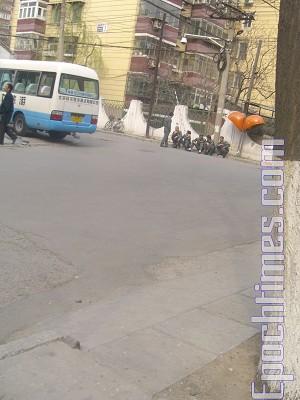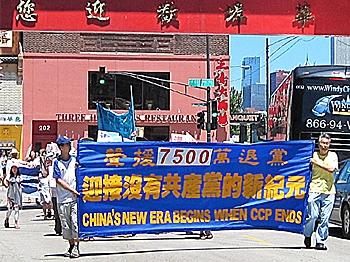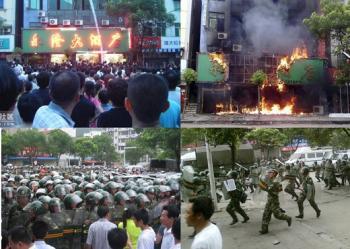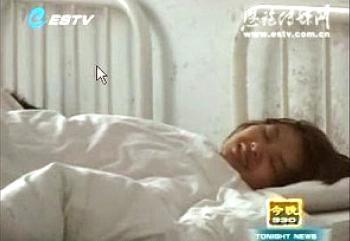Chinese human rights lawyer Gao Zhisheng, having been prevented from contacting the outside world for nearly eight months, succeeded in calling the Beijing-based rights activist Hu Jia on April 6. Four days later Hu, who has released the recording of the phone conversation on the Internet and tried to rescue Gao, was held incommunicado.
Jailed at Home
Gao was abducted from his sister’s home in the Shandong province on Aug. 15, 2006, after he had been subject to six consecutive months of surveillance by Chinese agents, repeated death threats, and three purported attempts to take his life.
He was tried on Dec. 12, 2006 for “inciting subversion,” which included posting on the Internet three open letters to top Chinese leaders appealing for adherents of the Falun Gong spiritual movement persecuted in China. Neither his family nor his lawyer was informed about the hearing.
Ten days later Gao was given a three-year suspended prison sentence, to be executed in the event that he commits another “crime” in five years. He was released on the same day but could not be contacted since then.
According to Gao, over a hundred agents are stationed outside where he lives, monitoring his family round the clock; they disguise themselves as pedestrians and hawkers; and more than ten vehicles are parked there at night. He said his whole family “is like under a cover.”
“What can I do?! My family will be pushed to death if it continued this way … If I offended the Chinese Communist Party (CCP) by telling the truth, then what have my wife and my children done?! My two poor children!” Gao complained to Hu.
The April 6 call—47 minutes—was much longer than what Gao had expected. Gao said he was using a phone card given to him with supposedly only 20 cents left. He managed to read his third letter to Hu in its entirety over the phone. The previous two never reached Hu.
Torture and Intimidation
The letter details the torture and intimidation that led to Gao’s compromise with his captors.
Gao said that throughout the whole time between his abduction and his release—including the court hearing, he was always called by the number “815” as he was abducted on Aug. 15.
During the 129-day period, he said he suffered different forms of torture carried out by inmates for extended periods of time: He was handcuffed for totally 600 hours, tied to a specially made iron chair for 590 hours, surrounded by strong light for 590 hours, and was forced to sit on the floor with legs crossed for 800 hours; the longest time he was bound to a chair was 109 hours, he said.
It was only when his family and relatives became the targets of persecution that Gao gave in.
“They openly threatened to torment their spirit, to completely destroy the future of my children, my wife, and all members of our two families.”
At this point, Gao wrote in the letter that despite his previous knowledge of the Chinese authorities, he had underestimated how far they could go in “nakedly using shameless and ruthless means” to achieve their goals.
Finally Gao agreed to write a public statement and to be video-taped saying that he voluntarily pled guilty.
Gao confirmed that he authored at least one of the two public statements that appeared on the Internet early this year and have generated opinions against him. But there is confusion about the date. The Internet public statements are dated Oct. 5 and Oct. 29, 2006; both Hu and Gao were speaking about a public statement of Nov. 29.
While the public statement was genuine, Gao said, not many people cared about what happened behind the paper. The statement was written partly under the condition that 5,000 yuan (US$633) from his savings that had been illegally seized by the authorities would be given to his wife and children, he said.
Two Targets
Gao said the Chinese authorities’ two main concerns in arresting him were Falun Gong and the relay hunger strike for human rights that he initiated in February 2006.
“In the entire case, they were most concerned about Falun Gong and the human rights protest through [relay] hunger strike. They devoted their energy mainly to my relationship with Falun Gong—how close the relationship is, my open letters, and the hunger strike protests. I clearly feel that Falun Gong and human rights protest are currently the top two worries of the reactionary force within the Chinese communist regime.”
Silencing Hu
Hu was told by the police on April 10 that the Public Security Office in Bejing had decided to put him under house arrest in order to stop him from going to the German Embassy, said Hu in an interview with BBC’s Chinese.com.
After the phone call with Gao, Hu immediately called the German Embassy and said he would discuss with them the situation of Gao and his family. His call was monitored, resulting in Hu’s arrest.
An AIDS activist and outspoken human rights advocate, Hu was detained for 41 days early last year. Then he was under police surveillance for more than 200 days until Feb. 16, 2007 when he was allowed to make a trip to Hong Kong.
Hu is said to be suffering from Hepatitis B and in the early stage of liver cirrhosis.
International Responses
NGOs and human rights advocates around the world have responded to the torment endured by Gao and his family with indignation.
The Global Coalition in Support of Attorney Gao Zhisheng released a statement on April 7 condemning the persecution of Gao and his family while demanding their full freedom. On April 10, the Global Service Center for Quitting the Chinese Communist Party also issued a stern statement demanding the restoration of normal life for the Gaos.
Sun Wenguang, professor emeritus of Shandong University, released on April 8 an article titled “Where is Human Rights?—In Support of Gao Zhisheng (part 4).” He wrote, “Lawyers are the warriors in exposing torture. Now China’s noted human rights lawyer is himself subject to torture. Where are China’s human rights?”
A senior official of the State Department, commenting on the situation faced by Gao and his family, said they were concerned with the report that Mr. Gao was mistreated while in custody and that the confession leading to his conviction on charges of inciting subversion may have been coerced.
Although Gao has said in the letter read over the phone that he had decided to devote himself to protecting his family rather than fighting for social justice, many praise his courage in breaking through the house arrest. Gao’s determination to reach the public is clearly a defiance of the surveillance imposed on him. In doing so, he may be considered to have committed another “crime” by the authorities.




